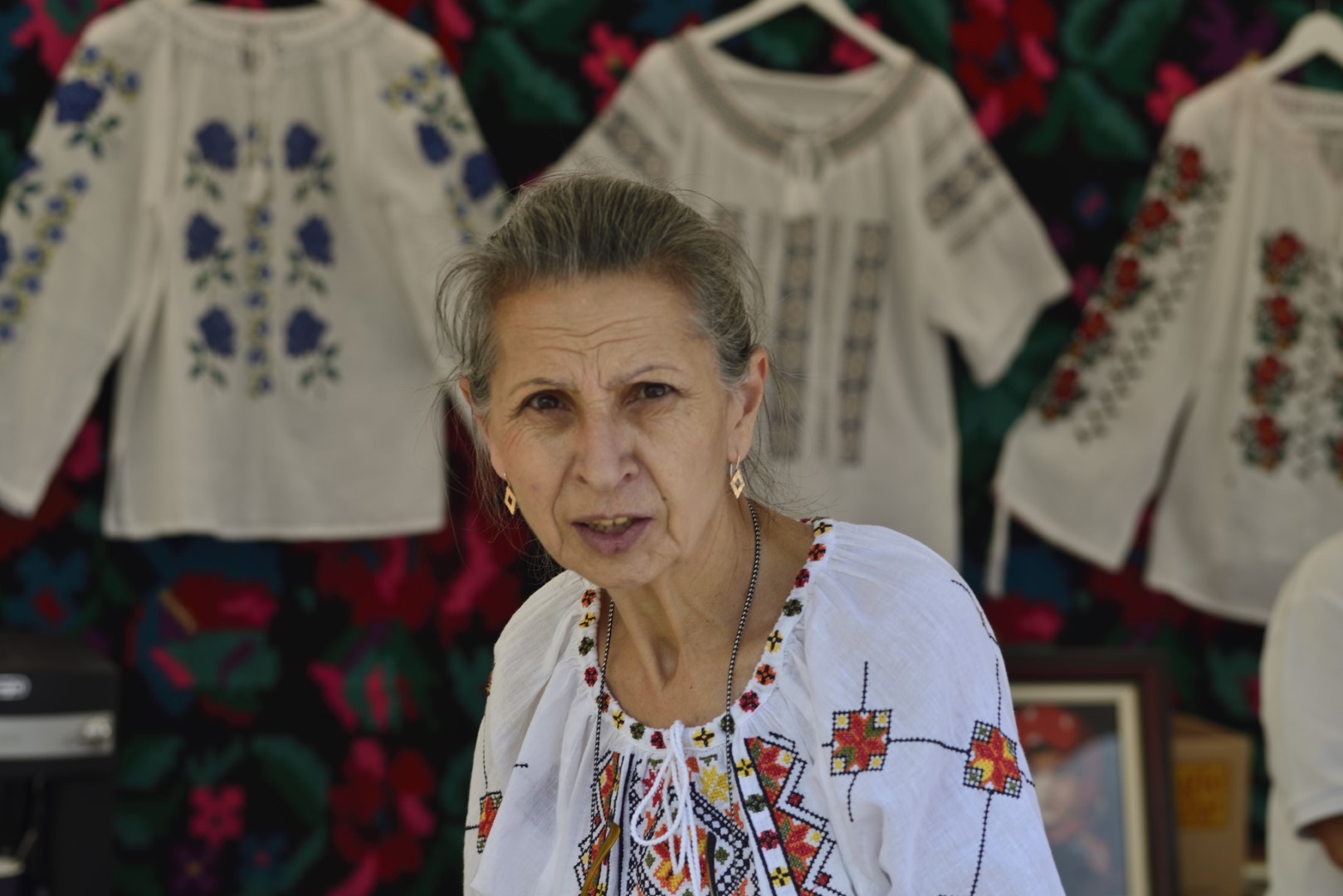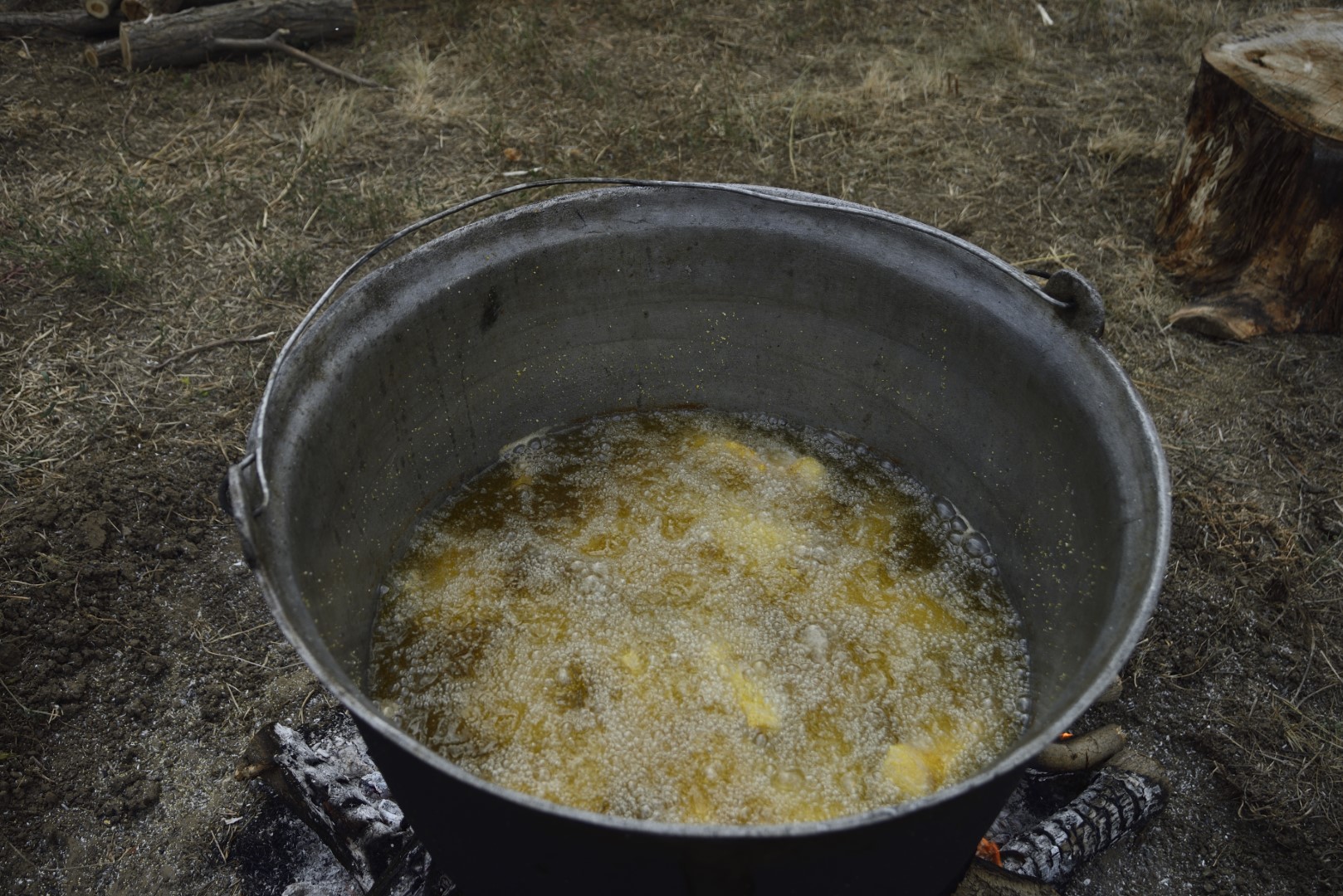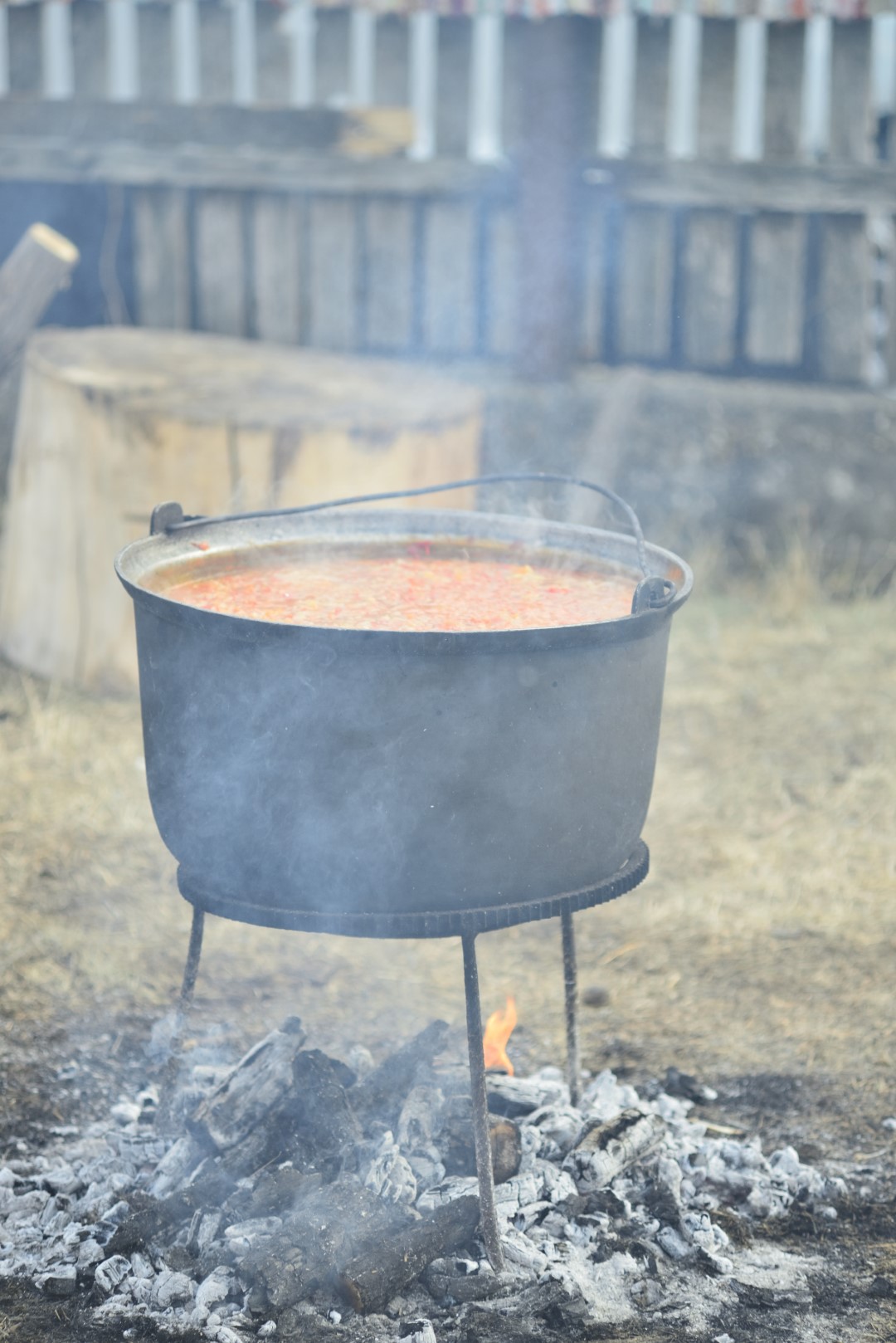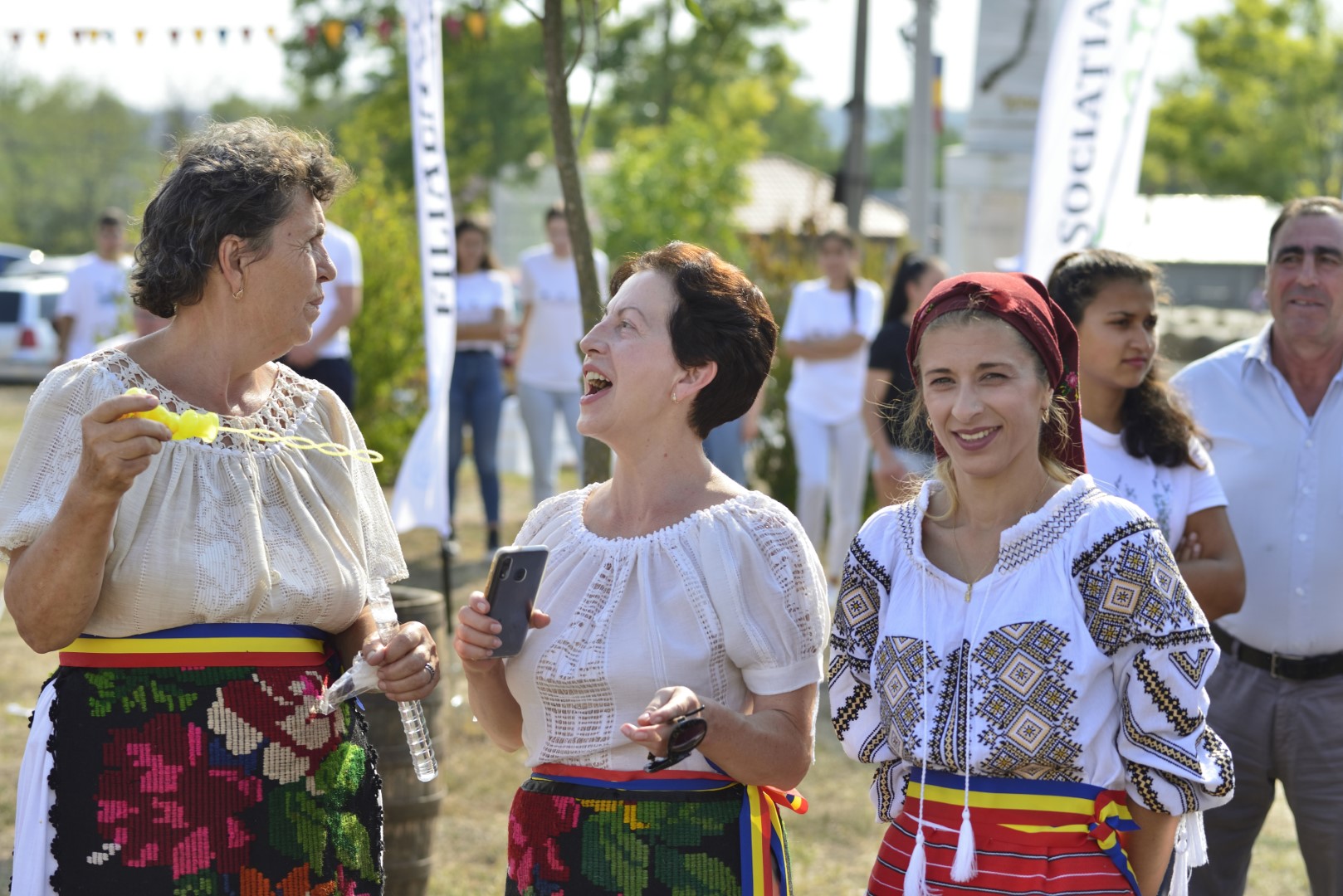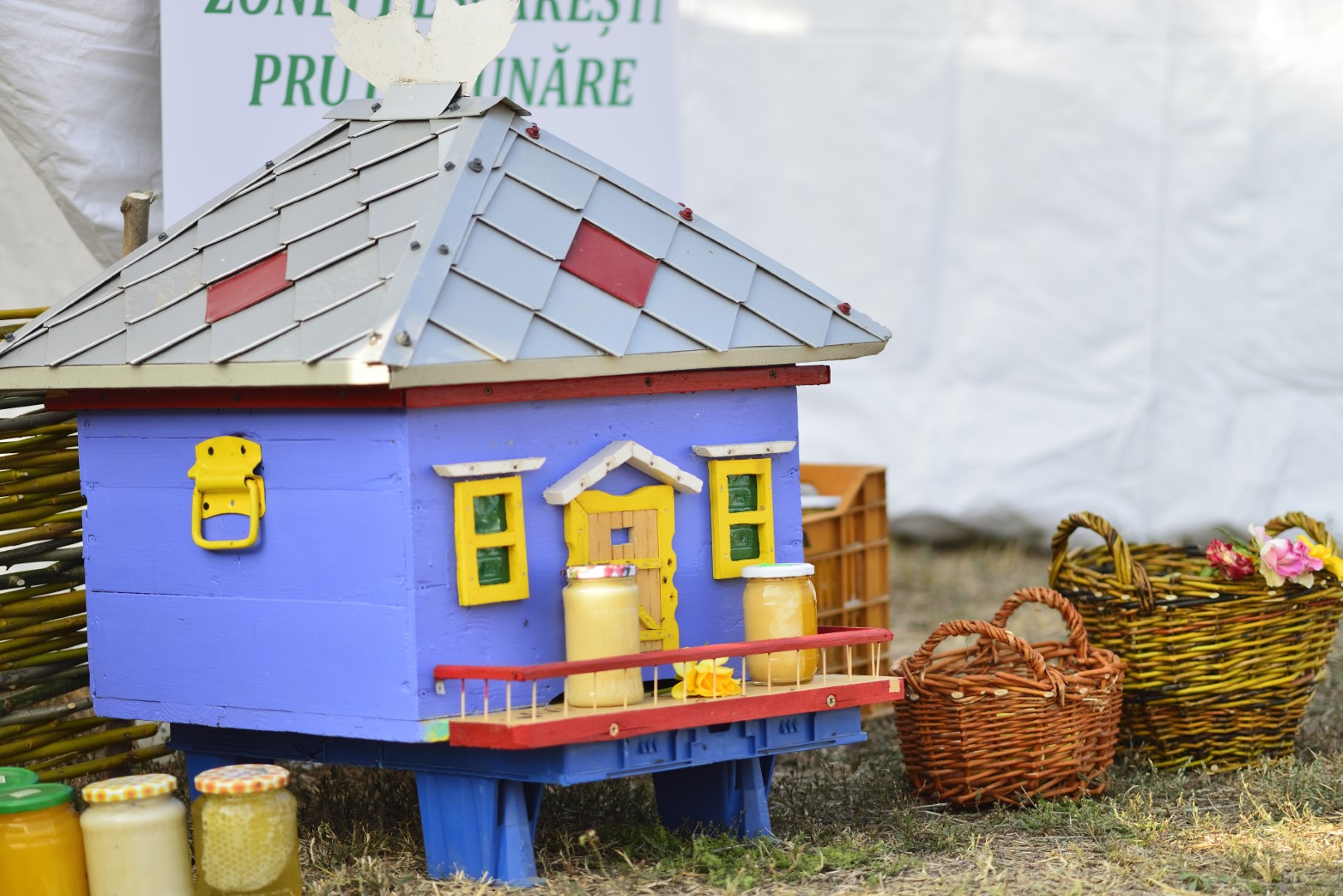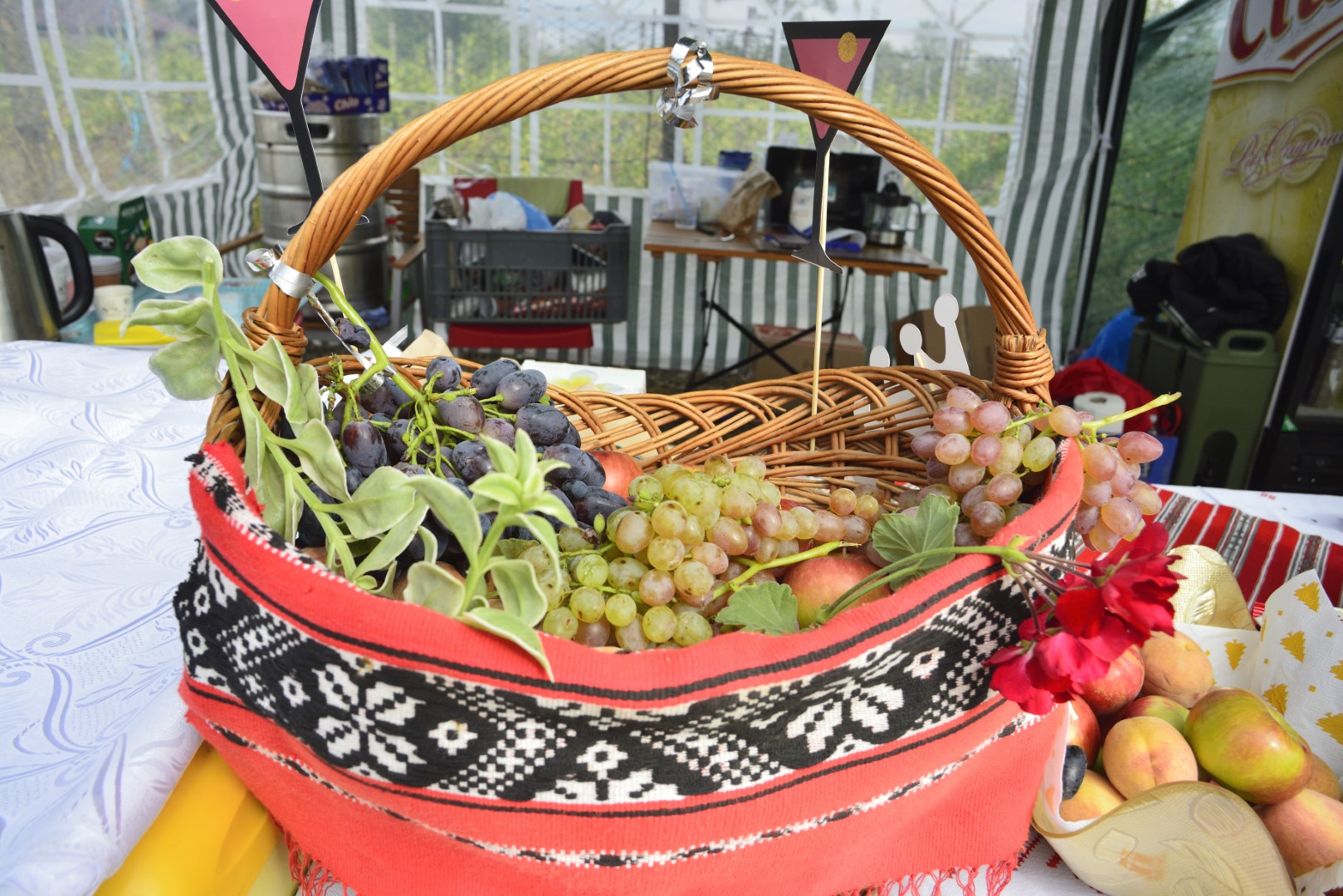Reconnecting with nature
CU PEȘTELE`N BUCATE
Gastronomic Festival with a fishing specialty CU PEȘTELE`N BUCATE
Dive into the flavors of tradition at the "CU PEȘTELE'N BUCATE" Gastronomic Festival! Experience the rich tastes of the Prut River with exquisite fish dishes, freshly caught and expertly prepared. Celebrate local culinary heritage, enjoy live cooking demonstrations, and savor the finest fish specialties in a vibrant atmosphere. Join us for a feast that connects community, culture, and nature—an unforgettable journey of taste!
Romania
Regional
The rural communities in Galați County, located along the Prut River, which forms a natural border between Romania and the European Union with the Republic of Moldova, are:
Cavadinești
Suceveni
Oancea
Vlădești
These communities are situated in the northern part of the Prut-Dunăre fishing area in Galați County. They are part of the region's cultural and natural heritage, with a strong connection to fishing traditions and the Prut River.
Cavadinești
Suceveni
Oancea
Vlădești
These communities are situated in the northern part of the Prut-Dunăre fishing area in Galați County. They are part of the region's cultural and natural heritage, with a strong connection to fishing traditions and the Prut River.
It addresses urban-rural linkages
It refers to other types of transformations (soft investment)
Yes
2024-10-26
No
No
No
As a representative of an organisation
The "CU PEȘTELE'N BUCATE" Gastronomic Festival aims to celebrate and promote the culinary traditions of the rural communities along the Prut River, particularly in the northern part of Galați County. This region, rich in fishing heritage, serves as the natural border between Romania and the Republic of Moldova. The festival highlights the unique fishing specialties from these communities, showcasing locally sourced fish dishes and fostering a deeper appreciation for the region's cultural and gastronomic wealth.
Overall Aim: The festival's main goal is to preserve and promote the local fishing traditions of Galați County through culinary experiences. By celebrating the region's rich food culture, we aim to raise awareness of sustainable fishing practices, foster community engagement, and encourage the revitalization of rural economies. This initiative serves as a platform to connect local fishermen, chefs, and visitors, all while enhancing the tourism potential of the region.
Target Group(s): The project primarily targets:
Local Communities – Residents of rural communities along the Prut River, including Cavadinești, Suceveni, Oancea, and Vlădești, whose livelihoods are often centered around fishing and agriculture.
Tourists and Visitors – Individuals from Romania, Moldova, and abroad interested in exploring traditional Romanian cuisine, specifically fish dishes and river-based culinary practices.
Local Entrepreneurs and Artisans – Fishermen, local chefs, food producers, and artisans who contribute to the culinary and cultural landscape of the region.
Cultural and Culinary Enthusiasts – People who are passionate about sustainable food practices, local traditions, and the connection between culture, food, and nature.
Specific Objectives:
Promote Local Gastronomy: To showcase traditional fish dishes, such as those made from local Prut River catches, and introduce these to a broader audience through the festival.
Sustainability Awareness.
Overall Aim: The festival's main goal is to preserve and promote the local fishing traditions of Galați County through culinary experiences. By celebrating the region's rich food culture, we aim to raise awareness of sustainable fishing practices, foster community engagement, and encourage the revitalization of rural economies. This initiative serves as a platform to connect local fishermen, chefs, and visitors, all while enhancing the tourism potential of the region.
Target Group(s): The project primarily targets:
Local Communities – Residents of rural communities along the Prut River, including Cavadinești, Suceveni, Oancea, and Vlădești, whose livelihoods are often centered around fishing and agriculture.
Tourists and Visitors – Individuals from Romania, Moldova, and abroad interested in exploring traditional Romanian cuisine, specifically fish dishes and river-based culinary practices.
Local Entrepreneurs and Artisans – Fishermen, local chefs, food producers, and artisans who contribute to the culinary and cultural landscape of the region.
Cultural and Culinary Enthusiasts – People who are passionate about sustainable food practices, local traditions, and the connection between culture, food, and nature.
Specific Objectives:
Promote Local Gastronomy: To showcase traditional fish dishes, such as those made from local Prut River catches, and introduce these to a broader audience through the festival.
Sustainability Awareness.
Sustainability
Local Gastronomy
Fishing Heritage
Cultural Exchange
Community Engagement
The "CU PEȘTELE'N BUCATE" Gastronomic Festival was designed with a strong commitment to sustainability, focusing on both environmental and social dimensions. The key sustainability objectives were aimed at fostering a harmonious relationship between the region's cultural heritage, sustainable food practices, and community development. These objectives have been carefully met through the implementation of strategies that reduce environmental impact, promote local culture, and ensure long-term economic benefits for the community. To foster social cohesion and ensure that the benefits of the festival reached all segments of the local population, including marginalized groups.
How It Was Met: The festival was designed to be inclusive, involving people from all generations and backgrounds. Local residents, fishermen, artisans, and small businesses were encouraged to participate and contribute, ensuring that the event was representative of the community’s diverse voices. Special initiatives were made to engage youth and marginalized groups in the festival’s planning and activities, creating opportunities for social and economic inclusion.
Exemplary Aspects: The festival’s commitment to social inclusion and community engagement exemplifies how sustainability extends beyond the environment to encompass social dimensions. By giving marginalized groups a voice and a platform, the festival helped strengthen social ties and promoted equitable development. The "CU PEȘTELE'N BUCATE" Gastronomic Festival is an exemplary model of sustainability, demonstrating how a cultural and gastronomic event can promote environmental, economic, and social sustainability. Through its focus on sustainable fishing, local sourcing, waste reduction, cultural education, and social inclusion, the festival successfully met its sustainability objectives and set a standard for future events
How It Was Met: The festival was designed to be inclusive, involving people from all generations and backgrounds. Local residents, fishermen, artisans, and small businesses were encouraged to participate and contribute, ensuring that the event was representative of the community’s diverse voices. Special initiatives were made to engage youth and marginalized groups in the festival’s planning and activities, creating opportunities for social and economic inclusion.
Exemplary Aspects: The festival’s commitment to social inclusion and community engagement exemplifies how sustainability extends beyond the environment to encompass social dimensions. By giving marginalized groups a voice and a platform, the festival helped strengthen social ties and promoted equitable development. The "CU PEȘTELE'N BUCATE" Gastronomic Festival is an exemplary model of sustainability, demonstrating how a cultural and gastronomic event can promote environmental, economic, and social sustainability. Through its focus on sustainable fishing, local sourcing, waste reduction, cultural education, and social inclusion, the festival successfully met its sustainability objectives and set a standard for future events
The "CU PEȘTELE'N BUCATE" Gastronomic Festival was designed with the dual aim of offering an exceptional aesthetic experience and enriching cultural engagement, providing visitors with a meaningful, immersive, and visually stimulating experience. The project’s objectives focused on highlighting the beauty of local traditions, the authenticity of the region’s gastronomy, and creating an inclusive, engaging atmosphere that celebrated both cultural heritage and contemporary creativity. These objectives were met through the thoughtful integration of design, local craftsmanship, and cultural storytelling, ensuring that the aesthetic quality and overall visitor experience were memorable and impactful. The "CU PEȘTELE'N BUCATE" Gastronomic Festival excelled in meeting its objectives of enhancing the aesthetic quality and overall experience for visitors. Through thoughtful design, cultural integration, and sensory engagement, the festival provided a memorable and immersive experience that celebrated the region’s culinary traditions and artistic heritage. By creating an environment that encouraged participation, interaction, and connection, the event showcased how festivals can serve as platforms for cultural exchange and community building, while also offering a rich, aesthetic experience that appeals to all the senses.
The "CU PEȘTELE'N BUCATE" Gastronomic Festival placed inclusion at the heart of its design, ensuring that it was accessible and affordable to all, regardless of socio-economic background, physical ability, or age. The project aimed to foster an inclusive environment where every visitor, participant, and local community member felt valued and had the opportunity to contribute. By focusing on accessibility, affordability, and inclusive governance, the festival aimed to break down barriers and promote a sense of shared ownership and participation, ensuring that the benefits of the event were widely distributed across the community. The "CU PEȘTELE'N BUCATE" Gastronomic Festival was an exemplary model of inclusion, achieving its objectives of accessibility, affordability, and community participation through thoughtful design and governance. By ensuring that the festival was open to all, regardless of physical ability, socio-economic status, or background, the event set a standard for future cultural initiatives. The inclusive approach not only enhanced the quality of the festival experience for attendees but also fostered a stronger sense of community and empowerment for local residents, particularly marginalized groups. This holistic approach to inclusion can serve as a model for other cultural, social, and community-based projects, promoting equity and social justice in public life.
The involvement of citizens and civil society was central to the success of the "CU PEȘTELE'N BUCATE" Gastronomic Festival. The project aimed to ensure broad community participation, not only as attendees but as active contributors, ensuring that it reflected local culture, values, and aspirations. Citizen and civil society involvement in the project took place at multiple stages, from conceptualization to execution, creating an environment of shared ownership, responsibility, and pride. The impact of citizen and civil society involvement in the "CU PEȘTELE'N BUCATE" Gastronomic Festival was multifaceted. It not only made the festival more inclusive and representative of local culture but also fostered a sense of ownership and responsibility among community members. This collaborative approach resulted in a stronger connection between citizens and their cultural heritage, as well as a deeper sense of pride in their local community. By providing opportunities for skill-building and economic participation, the festival empowered local citizens, particularly marginalized groups, while also enhancing social cohesion and community solidarity. Ultimately, the active involvement of citizens and civil society organizations ensured that the festival was not just an event but a meaningful community celebration that contributed to the cultural, social, and economic development of the region. The involvement of citizens and civil society was integral to the festival’s success, driving its cultural authenticity, social inclusion, and community empowerment. The project demonstrated the power of active participation in shaping public events, leading to outcomes that were both locally-driven and impactful. This approach serves as an exemplary model for future community-based projects, showing how citizen and civil society involvement can create more sustainable, inclusive, and culturally resonant initiatives.
The "CU PEȘTELE'N BUCATE" Gastronomic Festival was designed and implemented through the collaboration of multiple stakeholders at local, regional, national, and European levels. Their involvement at different stages of the project ensured that it was inclusive, impactful, and sustainable. Each level of engagement brought unique strengths, resources, and perspectives to the project, ultimately contributing to its success.
1. Local Stakeholders (Communities and Citizens):
Role and Level of Involvement: Local stakeholders, particularly residents and community groups from the rural fishing areas along the Prut River, played a central role in the festival’s design and execution. These communities, including local fishermen, chefs, artisans, and farmers, provided the authentic ingredients, recipes, and cultural knowledge that formed the backbone of the festival. Their involvement was essential in showcasing local traditions, especially through the gastronomy elements of the event, as they ensured the dishes prepared were representative of the region’s culinary heritage.
In addition, local youth and volunteer groups actively participated in festival organization, offering support in logistics, event promotion, and visitor services. Community members were encouraged to take part in the planning process, making sure the festival represented their needs and aspirations. Local NGOs and social organizations were instrumental in organizing inclusivity activities and providing support for disadvantaged groups, ensuring that the event was accessible to all members of the community.
Added Value: The direct involvement of local stakeholders provided authenticity, rooted the event in the regional cultural context, and ensured that it was meaningful for the community. This also strengthened social bonds within the community, encouraged local ownership of the festival, and fostered a sense of pride and engagement with their heritage.
1. Local Stakeholders (Communities and Citizens):
Role and Level of Involvement: Local stakeholders, particularly residents and community groups from the rural fishing areas along the Prut River, played a central role in the festival’s design and execution. These communities, including local fishermen, chefs, artisans, and farmers, provided the authentic ingredients, recipes, and cultural knowledge that formed the backbone of the festival. Their involvement was essential in showcasing local traditions, especially through the gastronomy elements of the event, as they ensured the dishes prepared were representative of the region’s culinary heritage.
In addition, local youth and volunteer groups actively participated in festival organization, offering support in logistics, event promotion, and visitor services. Community members were encouraged to take part in the planning process, making sure the festival represented their needs and aspirations. Local NGOs and social organizations were instrumental in organizing inclusivity activities and providing support for disadvantaged groups, ensuring that the event was accessible to all members of the community.
Added Value: The direct involvement of local stakeholders provided authenticity, rooted the event in the regional cultural context, and ensured that it was meaningful for the community. This also strengthened social bonds within the community, encouraged local ownership of the festival, and fostered a sense of pride and engagement with their heritage.
The design and implementation of the "CU PEȘTELE'N BUCATE" Gastronomic Festival integrated multiple disciplines and knowledge fields, each contributing to the overall success of the project. The collaboration between experts from various domains created a dynamic and multi-dimensional approach to festival planning and execution, ensuring its cultural richness, social inclusivity, sustainability, and economic impact. Traditional Cuisine, Local Food Culture Interaction and Value: At the core of the festival was the focus on local gastronomy and traditional culinary practices, particularly those related to the region’s fishing heritage. Chefs, food historians, and local culinary experts worked together to curate a menu that not only showcased the regional fishing traditions but also celebrated the historical and cultural importance of local dishes. This collaboration ensured that the dishes presented were both authentic and aligned with contemporary culinary trends, offering visitors a unique gastronomic experience that connected them to the local culture. The fusion of cultural heritage and culinary expertise resulted in a deeper understanding and appreciation of the region’s history, traditions, and food practices. The key added value of this multi-disciplinary collaboration was the creation of a holistic and interconnected project. Each field brought its expertise to address specific aspects of the festival, while also considering broader factors such as sustainability, inclusivity, and community impact. By engaging experts from various fields, the festival became more than just a cultural celebration – it became a platform for social cohesion, economic development, and environmental awareness. The seamless interaction between disciplines ensured that the festival was well-rounded, innovative, and impactful, addressing the needs and aspirations of the local community while also attracting external attention and fostering cultural exchange.
Unlike many traditional gastronomic festivals, which focus solely on showcasing dishes, CU PEȘTELE'N BUCATE places a strong emphasis on sustainability. The festival prioritizes the use of local, responsibly sourced ingredients from the Prut River area, ensuring the preservation of local fish species and the sustainable management of the river’s ecosystems. Additionally, the festival adopts a circular economy approach by incorporating waste reduction strategies, including recycling, composting, and minimizing food waste. It challenges the typical model of mass consumption at events and showcases a sustainable, eco-friendly way of organizing a large-scale food event. The festival’s innovative approach lies in its use of gastronomy as a medium for cultural expression and heritage revitalization. While many festivals may celebrate food, CU PEȘTELE'N BUCATE focuses on the authentic culinary traditions of the rural fishing communities along the Prut River, linking food with local identity, cultural history, and regional pride. It encourages the preservation of traditional cooking methods and recipes that have been passed down through generations, some of which are at risk of being forgotten in today’s fast-paced world. This connection between food, culture, and heritage is not commonly seen in other mainstream gastronomic events, where food may be showcased without much emphasis on its cultural significance. The festival is designed not only as a cultural and gastronomic celebration but also as a sustainable tourism initiative aimed at revitalizing the rural Prut-Dunăre region. It serves as a model for other rural regions by promoting local tourism while respecting the environment and enhancing the region’s socio-economic development. Through partnerships with local businesses and the regional government, the festival becomes an instrument for regional branding, attracting sustainable tourism and encouraging responsible travel practices.
The festival used gastronomy as a vehicle for cultural storytelling, ensuring that local culinary traditions and historical knowledge were celebrated. This methodology focused on preserving and reviving the local food culture while adapting it to modern sustainability needs.
Implementation:
Involving elders and local chefs to teach younger generations about traditional cooking methods and ingredients.
Organizing cultural performances, workshops, and exhibitions that illustrated the historical significance of fishing and food traditions in the region.
Documenting recipes and food-related stories to create educational content and promote the cultural value of the local cuisine.
Impact: The festival contributed to the preservation and revitalization of the local culture, ensuring that these traditions were passed down to future generations. By incorporating modern sustainable practices, the event showcased how traditional food cultures could evolve and remain relevant in contemporary society. The festival was designed with sustainability at its core, focusing on the principles of the circular economy and environmental conservation. This meant reducing waste, sourcing materials responsibly, and incorporating sustainable practices into every aspect of the event.
Implementation:
Sourcing locally grown produce and fish in a sustainable manner, supporting responsible fishing and farming practices.
Using eco-friendly materials for event infrastructure, decorations, and packaging (e.g., biodegradable or recyclable materials).
Organizing waste management initiatives, such as composting food waste, recycling, and minimizing single-use plastics.
Partnering with local environmental organizations to raise awareness about sustainable practices and biodiversity preservation.The methodology of the "CU PEȘTELE'N BUCATE" Gastronomic Festival was built upon a foundation of inclusivity, sustainability, cultural preservation, and community involvement.
Implementation:
Involving elders and local chefs to teach younger generations about traditional cooking methods and ingredients.
Organizing cultural performances, workshops, and exhibitions that illustrated the historical significance of fishing and food traditions in the region.
Documenting recipes and food-related stories to create educational content and promote the cultural value of the local cuisine.
Impact: The festival contributed to the preservation and revitalization of the local culture, ensuring that these traditions were passed down to future generations. By incorporating modern sustainable practices, the event showcased how traditional food cultures could evolve and remain relevant in contemporary society. The festival was designed with sustainability at its core, focusing on the principles of the circular economy and environmental conservation. This meant reducing waste, sourcing materials responsibly, and incorporating sustainable practices into every aspect of the event.
Implementation:
Sourcing locally grown produce and fish in a sustainable manner, supporting responsible fishing and farming practices.
Using eco-friendly materials for event infrastructure, decorations, and packaging (e.g., biodegradable or recyclable materials).
Organizing waste management initiatives, such as composting food waste, recycling, and minimizing single-use plastics.
Partnering with local environmental organizations to raise awareness about sustainable practices and biodiversity preservation.The methodology of the "CU PEȘTELE'N BUCATE" Gastronomic Festival was built upon a foundation of inclusivity, sustainability, cultural preservation, and community involvement.
The community-centered approach is one of the most impactful aspects of the festival. Involving local residents, including fishermen, farmers, artisans, and chefs, ensures the authenticity and relevance of the event, while also fostering local pride and ownership. This participatory approach is highly transferable and can be adapted to other communities, particularly in rural or underdeveloped areas, where local knowledge and traditions are valuable but often underutilized.
The festival’s emphasis on sustainability, waste reduction, and the circular economy offers a practical model for environmentally conscious event planning. Replicating these practices can help other communities organize events that minimize their environmental footprint while promoting responsible consumption and waste management.
The festival’s integration of gastronomy as a cultural tool allows for the preservation and revitalization of local food traditions. The focus on promoting local cuisines while adapting them to modern sustainability practices offers a valuable lesson for other regions that wish to preserve their cultural heritage and foster social inclusion. This methodology can be transferred to different communities or countries with rich food traditions, enabling them to showcase their identity in a sustainable and inclusive way.
The festival’s focus on cross-border cooperation between Romania and Moldova is a unique aspect that can be replicated in other border regions where shared cultural and culinary traditions exist. The festival model highlights the potential for strengthening ties and fostering collaboration across borders, enhancing cultural exchange and regional development.
The festival’s emphasis on social inclusion through affordable access and opportunities for marginalized groups is another key aspect that can be transferred to other contexts. This model ensures that the event benefits not only those who can afford to attend but also vulnerable groups.
The festival’s emphasis on sustainability, waste reduction, and the circular economy offers a practical model for environmentally conscious event planning. Replicating these practices can help other communities organize events that minimize their environmental footprint while promoting responsible consumption and waste management.
The festival’s integration of gastronomy as a cultural tool allows for the preservation and revitalization of local food traditions. The focus on promoting local cuisines while adapting them to modern sustainability practices offers a valuable lesson for other regions that wish to preserve their cultural heritage and foster social inclusion. This methodology can be transferred to different communities or countries with rich food traditions, enabling them to showcase their identity in a sustainable and inclusive way.
The festival’s focus on cross-border cooperation between Romania and Moldova is a unique aspect that can be replicated in other border regions where shared cultural and culinary traditions exist. The festival model highlights the potential for strengthening ties and fostering collaboration across borders, enhancing cultural exchange and regional development.
The festival’s emphasis on social inclusion through affordable access and opportunities for marginalized groups is another key aspect that can be transferred to other contexts. This model ensures that the event benefits not only those who can afford to attend but also vulnerable groups.
The project addresses the global challenge of climate change and the urgent need for environmental sustainability by promoting sustainable food systems and practices. The festival emphasizes locally sourced, eco-friendly ingredients, as well as waste reduction techniques, such as composting, recycling, and using sustainable packaging materials. By educating attendees on the environmental impact of their food choices, the project raises awareness about the importance of sustainable food production and consumption.
The project tackles the global issue of biodiversity loss by highlighting the importance of conserving local ecosystems, particularly those related to water bodies like the Prut River. Through its focus on sustainable fishing and the promotion of local species, the festival raises awareness about the importance of preserving aquatic biodiversity, which is often threatened by overfishing, pollution, and habitat destruction.
The project addresses the global challenge of social exclusion and economic inequality by emphasizing affordability and accessibility for marginalized communities. The festival works to ensure that everyone, regardless of their economic status, has the opportunity to participate in cultural and culinary experiences. Additionally, it supports local businesses and artisans, providing economic opportunities for community members, particularly in rural and economically disadvantaged areas.
The project addresses the global challenge of cultural erosion caused by globalization by focusing on the preservation and celebration of local culinary and cultural traditions. As globalization often leads to the homogenization of cultures, this project highlights the importance of maintaining and showcasing the unique food traditions and practices of the Prut-Dunăre region.
The project addresses the challenge of unsustainable tourism and the need for local economic development by promoting responsible tourism that benefits the community.
The project tackles the global issue of biodiversity loss by highlighting the importance of conserving local ecosystems, particularly those related to water bodies like the Prut River. Through its focus on sustainable fishing and the promotion of local species, the festival raises awareness about the importance of preserving aquatic biodiversity, which is often threatened by overfishing, pollution, and habitat destruction.
The project addresses the global challenge of social exclusion and economic inequality by emphasizing affordability and accessibility for marginalized communities. The festival works to ensure that everyone, regardless of their economic status, has the opportunity to participate in cultural and culinary experiences. Additionally, it supports local businesses and artisans, providing economic opportunities for community members, particularly in rural and economically disadvantaged areas.
The project addresses the global challenge of cultural erosion caused by globalization by focusing on the preservation and celebration of local culinary and cultural traditions. As globalization often leads to the homogenization of cultures, this project highlights the importance of maintaining and showcasing the unique food traditions and practices of the Prut-Dunăre region.
The project addresses the challenge of unsustainable tourism and the need for local economic development by promoting responsible tourism that benefits the community.
One of the key outcomes of the project was the successful integration of sustainable food systems within the festival’s activities. By prioritizing locally sourced ingredients, promoting sustainable fishing practices, and reducing waste through eco-friendly practices, the festival has set an example for future events in the region.
The festival created new economic opportunities for local communities, particularly in rural and disadvantaged areas along the Prut River. By featuring local artisans, chefs, and farmers, the event not only promoted the region’s unique culinary traditions but also directly contributed to the local economy.
The festival was designed with accessibility and affordability in mind, ensuring that marginalized and vulnerable groups could actively participate. The project focused on removing barriers for people with disabilities, the elderly, and low-income individuals, offering discounted tickets, free access for certain groups, and wheelchair-accessible facilities.
One of the most important impacts of the festival was its role in preserving and promoting local culture. The project celebrated the rich culinary heritage of the Prut-Dunăre region, showcasing traditional recipes, fishing techniques, and cooking methods. The festival also created a space for local artists, performers, and craftsmen to share their work and connect with the broader community.
Through community engagement, the festival fostered the development of local governance models that included collaboration between citizens, local authorities, and businesses. This encouraged active participation and shared decision-making, helping to strengthen community ties and improve the overall effectiveness of local governance. The "CU PEȘTELE'N BUCATE" Gastronomic Festival has achieved numerous positive outcomes, impacting both direct and indirect beneficiaries.
The festival created new economic opportunities for local communities, particularly in rural and disadvantaged areas along the Prut River. By featuring local artisans, chefs, and farmers, the event not only promoted the region’s unique culinary traditions but also directly contributed to the local economy.
The festival was designed with accessibility and affordability in mind, ensuring that marginalized and vulnerable groups could actively participate. The project focused on removing barriers for people with disabilities, the elderly, and low-income individuals, offering discounted tickets, free access for certain groups, and wheelchair-accessible facilities.
One of the most important impacts of the festival was its role in preserving and promoting local culture. The project celebrated the rich culinary heritage of the Prut-Dunăre region, showcasing traditional recipes, fishing techniques, and cooking methods. The festival also created a space for local artists, performers, and craftsmen to share their work and connect with the broader community.
Through community engagement, the festival fostered the development of local governance models that included collaboration between citizens, local authorities, and businesses. This encouraged active participation and shared decision-making, helping to strengthen community ties and improve the overall effectiveness of local governance. The "CU PEȘTELE'N BUCATE" Gastronomic Festival has achieved numerous positive outcomes, impacting both direct and indirect beneficiaries.

